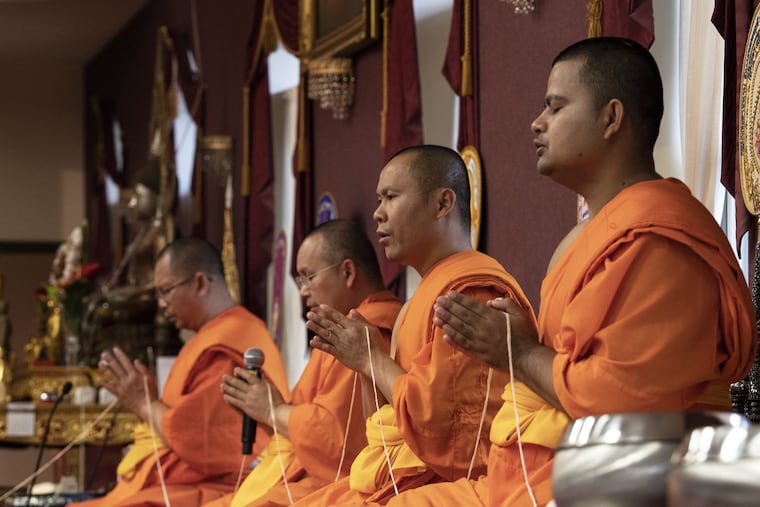‘They welcome people.’ Inside a Buddhist temple in Bucks County.
Wat Mongkoltepmunee in Bensalem is a meeting ground for Buddhists and members of the southeast Asian community in the tri-state area.

Tucked behind a line of trees and sandwiched between suburban apartment complexes, the stately building comes slowly into view, in shades of white, red, and glistening gold.
With its intricate, gilded architecture, the pagoda-like ceremony hall rises unexpectedly in an otherwise nondescript section of Bensalem.
A sign announces the destination: Wat Mongkoltepmunee. Buddhist temple. Home to five monks and a community of worshipers who for more than three decades have gathered at this cultural and spiritual enclave.
Inside the temple on a recent Sunday, the first women to arrive knelt in colorful skirts, closed their eyes, and bowed low — once, twice, three times. Soon after came others — more women, men, children. And the monks.
Sitting cross-legged before a golden Buddha that rose tall and bright in the center of the room, they began rhythmic chants in Pali, an ancient language, before the din dropped to silence. Then meditation began, and longtime worshipers like Khanin Suvarnasuddhi, 69, straightened their backs and closed their eyes to concentrate.
On an elevated platform in the center of a room, Chewa Skonsupaporn, a monk draped in bright orange robes, sat in silence, like the three monks to his left, as he led the group in meditation.
“We send love and kindness to whole people of the temple and all people and all animals,” he said during a brief break in the session. “If some guy cross us, OK, we send [love and kindness] to them first.”
That message is the essence of the weekly Sunday program at Wat Mongkoltepmunee, a Theravada Buddhist temple that serves as a meeting ground for Southeast Asians in Pennsylvania, New Jersey and beyond, although people of all backgrounds are welcome.
As the lights dimmed and people sat on the floor of the temple on a recent morning, Corinthian Rivera, 19, slowly pulled open the door, unsure of what to expect. He’d only ever gone to Christian churches. He padded in without shoes, as custom dictates, and crouched to take a spot at a meditation mat.
“I’ve come to a point in my life where I want better for myself, and every other direction I was heading, I was losing people left and right,” said Rivera, of Bensalem. “I wanted some type of clarity, and I wanted to try something different. I just wanted to, you know, shoot my shot.”
Rivera took it all in: the statues of Buddha, small and large, clustered around the front of the temple. Twenty-five white meditation mats laid over crimson-colored carpet. Vases of vibrant white and violet orchids, and leafy green plants in wooden planters carved into the shape of elephants, the national animal of Thailand. Two portraits of the late abbot Phra Mongkoltepmunee, for whom the temple is named. Two portraits of the late King Bhumibol Adulyadej of Thailand and his son, Maha Vajiralongkorn, the current king.
Rivera’s eyes, like those of the dozens of other worshipers in the temple, turned to the monks. Win Ajan, the newest monk, sat at the far right. Ajan, 27, was born in Nepal, but his parents sent him to Thailand to study Buddhism. He became a novice monk at 14, went to college in Bangkok, and practiced meditation in the jungle of Chiang Rai, a city in northern Thailand. He arrived in Bensalem 18 months ago.
He and his fellow monks teach the basic tenets of Buddhism: to live morally and mindfully in order to develop wisdom and understanding. Buddhists follow five moral precepts, Ajan explained: Don’t kill. Don’t steal. Don’t engage in sexual misconduct. Don’t lie or gossip. Don’t get drunk or high, because intoxication takes away from mindfulness.
“This is a way of life,” said Suvarnasuddhi, a worshiper at Wat Mongkoltepmunee for 35 years. “Be careful of what you say to others. Free speech is good here, this country. But for us, it has some line that you cannot cross — means you have to think first before you say anything.”
Worshipers say proudly that the temple — wat, in Thai — is an extension of the renowned Wat Paknam of Pasicharurn in Bangkok, Thailand, albeit smaller, and meant for those who can’t travel to Thailand. They say Wat Paknam is easily a dozen times bigger than Wat Mongkoltepmunee.
But to the typical passerby, Wat Mongkoltepmunee dazzles.
Inside the ceremony hall, which goes unused in the winter in favor of a nearby building with heat, a wax figure of the late Abbot Mongkoltepmunee is dressed in traditional monk robes and sits cross-legged at the base of a large statue of Buddha.
Unlike the multitude of Buddhist temples in Thailand, the temple on Knights Road is one of few outside Philadelphia and among the few dozen scattered across Pennsylvania and New Jersey.
The rarity of Buddhist temples in the area means some people will travel far to reach them, not only to meditate and recite traditional chants, but to share in a community with fellow Buddhists, most of whom are Thai, although others are Laotian, Cambodian, or Burmese.
Warren Kongchatree, 52, drives to Wat Mongkoltepmunee every week from his home in North Bergen, N.J.
David Doebley, 50, has come from Egg Harbor, N.J., with his wife for the last 10 years.
Suttinee Yookhansawad, 38, travels from Mount Laurel, where she owns a restaurant, Bhan Thai. They, and others who hail from New York and Delaware, have made friends at the temple and found familiar comfort in the meditation space, the temple’s five monks, and the children’s Sunday school, the home-cooked food served to share, and soft chatter in Thai.
“They welcome people,” Yookhansawad said. “They don’t say, ‘If you’re not Thai you cannot come.’ They welcome all of us. And they educate people.”